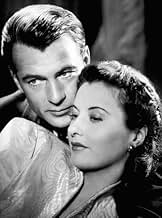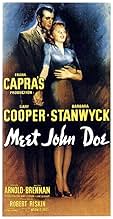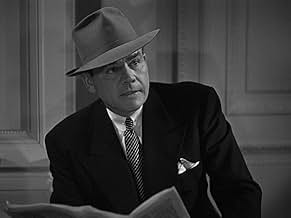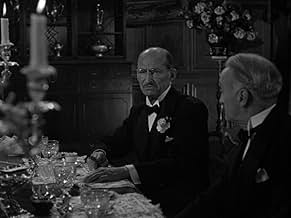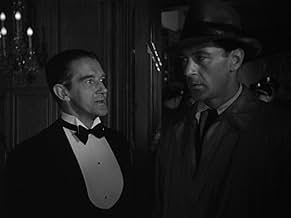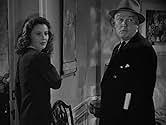AVALIAÇÃO DA IMDb
7,6/10
16 mil
SUA AVALIAÇÃO
Um sem-teto é recrutado por um colunista ambicioso para imitar uma pessoa inexistente que disse que cometeria suicídio em protesto, e começa um movimento político.Um sem-teto é recrutado por um colunista ambicioso para imitar uma pessoa inexistente que disse que cometeria suicídio em protesto, e começa um movimento político.Um sem-teto é recrutado por um colunista ambicioso para imitar uma pessoa inexistente que disse que cometeria suicídio em protesto, e começa um movimento político.
- Direção
- Roteiristas
- Artistas
- Indicado a 1 Oscar
- 4 vitórias e 1 indicação no total
Charles C. Wilson
- Charlie Dawson
- (as Charles Wilson)
Avaliações em destaque
Frank Capra's unabashed patriotism wins another pennant for Team U.S.A. with `Meet John Doe,' an Oscar-nominated feature (for original screenplay) that roots for the underdog while demonstrating the power of the people en masse. He backs up his strong, daunting ideology with sharp, crisp writing and even sharper character delineation. Capra's social piece was timely released in 1940, when Nazi sympathizers were gaining a potent voice in America, just prior to our involvement in WWII.
Struggling columnist Ann Mitchell (the incomparable Barbara Stanwyck) is one of many about to receive their walking papers as the latest casualties of a newspaper takeover. Learning that her dismissal is in part due to a writing style that lacks bite, she vents her anger on her last assignment, fabricating and printing a somber, biting `John Doe' letter. `Written' by a despairing, unemployed man, who, tired of life's indignities, has given up on an indifferent, capitalistic society, the writer vows to throw himself off the top of City Hall on Christmas Eve.
Ann's last column sparks a major outpouring of varying concern, not only from top government officials, but from newspaper competitors who claims the piece is a work of fiction designed to promote sales subscriptions, and from the public who are genuinely moved by this man's plight. Caught between a rock and a hard place, the new editor-in-chief (James Gleason, in a marvelous turn) reluctantly keeps Ann on the payroll (with a bonus) while deciding to run with the story. Auditioning indigent men to lend a face to their `John Doe,' they find their man in 'Long John' Willoughby (played to perfection by Gary Cooper), an ex-baseball player who has fallen on hard times. Willoughby becomes an instant celebrity and an identifiable symbol of integrity and humanity. `John Doe' clubs soon start sprouting up all over the place promoting `good neighbor' policies. Trouble brews, however, when a ruthless financier (played with typical malice by Edward Arnold) agrees to sponsor `John Doe' appearances for radio and the lecture circuit, then threatens the movement by using it for his own political aspirations.
Cooper and Stanwyck are ideal in their top roles. Stanwyck is peerless when it comes to playing smart, gutsy gals. Here, she shows all sorts of vibrant colors as an assertive reporter trying desperately to climb up the newspaper ladder without getting her hands too dirty, trapped on both sides of the fence and playing both sides superbly. Coop too is deeply affecting, the epitome of the `aw shucks' kind of 'everyman' who manages to find a stirring, articulate voice underneath all that awkwardness and reticence. Nobody plays this kind of role better.
It helps too that the leads are surrounded by all-star character pros. James Gleason is marvelous as the frustrated editor who must wrestle with his conscience as the hoax he orchestrated gets seriously out of hand. He has one exquisitely tipsy scene in a bar with Coop where he lays all the cards out on the table. Regis Toomey, as a prime spokesperson for the "John Doe" movement, has a touching moment as he expresses the impact the club has made on his community. Edward Arnold is exemplary as the manipulating moneybags, and Walter Brennan's straightforward Colonel is insightful as Coop's obstinate buddy who sees his friend falling into the same opportunistic trappings he is supposedly rebelling against. The one veteran, scene-stealing player not up to snuff is Spring Byington, who is stuck on the bench in a rather benign, devoted mom role.
The only foul ball I found in this fast-paced, smooth-running story takes place atop the City Hall with an overly hysterical Stanwyck punching home Capra's idealism ad nauseum. It could have been more effective with a still strong but subtler set-up and approach. So, hey, it's not quite a shutout, but why quibble when the rest of the film is way ahead of the game.
Like the equally dark `It's a Wonderful Life,' Capra's genius is that he knows how to pitch and score the important points when necessary, not only with laughter and tears, but with unyielding hope and, most significantly, with words. It's more than any home crowd can ask for.
Struggling columnist Ann Mitchell (the incomparable Barbara Stanwyck) is one of many about to receive their walking papers as the latest casualties of a newspaper takeover. Learning that her dismissal is in part due to a writing style that lacks bite, she vents her anger on her last assignment, fabricating and printing a somber, biting `John Doe' letter. `Written' by a despairing, unemployed man, who, tired of life's indignities, has given up on an indifferent, capitalistic society, the writer vows to throw himself off the top of City Hall on Christmas Eve.
Ann's last column sparks a major outpouring of varying concern, not only from top government officials, but from newspaper competitors who claims the piece is a work of fiction designed to promote sales subscriptions, and from the public who are genuinely moved by this man's plight. Caught between a rock and a hard place, the new editor-in-chief (James Gleason, in a marvelous turn) reluctantly keeps Ann on the payroll (with a bonus) while deciding to run with the story. Auditioning indigent men to lend a face to their `John Doe,' they find their man in 'Long John' Willoughby (played to perfection by Gary Cooper), an ex-baseball player who has fallen on hard times. Willoughby becomes an instant celebrity and an identifiable symbol of integrity and humanity. `John Doe' clubs soon start sprouting up all over the place promoting `good neighbor' policies. Trouble brews, however, when a ruthless financier (played with typical malice by Edward Arnold) agrees to sponsor `John Doe' appearances for radio and the lecture circuit, then threatens the movement by using it for his own political aspirations.
Cooper and Stanwyck are ideal in their top roles. Stanwyck is peerless when it comes to playing smart, gutsy gals. Here, she shows all sorts of vibrant colors as an assertive reporter trying desperately to climb up the newspaper ladder without getting her hands too dirty, trapped on both sides of the fence and playing both sides superbly. Coop too is deeply affecting, the epitome of the `aw shucks' kind of 'everyman' who manages to find a stirring, articulate voice underneath all that awkwardness and reticence. Nobody plays this kind of role better.
It helps too that the leads are surrounded by all-star character pros. James Gleason is marvelous as the frustrated editor who must wrestle with his conscience as the hoax he orchestrated gets seriously out of hand. He has one exquisitely tipsy scene in a bar with Coop where he lays all the cards out on the table. Regis Toomey, as a prime spokesperson for the "John Doe" movement, has a touching moment as he expresses the impact the club has made on his community. Edward Arnold is exemplary as the manipulating moneybags, and Walter Brennan's straightforward Colonel is insightful as Coop's obstinate buddy who sees his friend falling into the same opportunistic trappings he is supposedly rebelling against. The one veteran, scene-stealing player not up to snuff is Spring Byington, who is stuck on the bench in a rather benign, devoted mom role.
The only foul ball I found in this fast-paced, smooth-running story takes place atop the City Hall with an overly hysterical Stanwyck punching home Capra's idealism ad nauseum. It could have been more effective with a still strong but subtler set-up and approach. So, hey, it's not quite a shutout, but why quibble when the rest of the film is way ahead of the game.
Like the equally dark `It's a Wonderful Life,' Capra's genius is that he knows how to pitch and score the important points when necessary, not only with laughter and tears, but with unyielding hope and, most significantly, with words. It's more than any home crowd can ask for.
10B&W-2
This film offers a standing rebuke to critics who use the term "Capracorn". None of Capra's films are as blindly optimistic as is often argued, but this one is a pitch-black jeremiad against manipulation by the media. The mob scene at the "John Doe" convention is one of the powerful scenes ever filmed. Stanwyck is incredible as reporter Anne Mitchell. She is one of the great actresses of the century, and she always did her best work Capra, whose female characters are generally more compelling to the women we get in the movies of our "liberated" era. Cooper is fantastic as a truly "average" guy who is "awakened" by his experience with the John Doe movement, and Edward Arnold is absolutely terrifying in the role of Fascist D.B. Norton. This film is even more relevant today than when it was made, and I would argue that it should be viewed in high schools across the continent. Capra is asking his viewers to think critically of EVERYTHING they hear on the radio or see in papers or hear from elites, and amen to that!
After doing Mr Deeds Goes To Town and Mr Smith Goes To Washington for Columbia, Capra quit and made this third film about an average Joe thrust into a powerful world where exploitation is high on the agenda, but in true Capra style the story unfolds to a customary flip flop triumph.
Ann Mitchell is a struggling journalist who gets fired from her newspaper job by new editor Henry Connell, by way of venting her frustrations she writes in her stinging last article about a man called John Doe who is tired of being pushed around and held back by the big bosses, she finishes the piece by claiming that Doe will commit suicide on Christmas Eve by leaping off the roof of city hall, the public react to the letter with tremendous heart and Doe becomes a champion of the people.
After Connell gets interested in the letter Ann has to confess that she made it up, they hatch a plan to turn a real unemployed drop out into John Doe so as to continue the story and sell more papers, and of course Ann gets to keep her job. This brings in ex minor league pitcher Long John Willoughby, who is down on his luck and very short of cash, and this is when the story shifts from amiable comedy on to a much darker path, the result making for a riveting watch.
Whilst not being up with the best Capra films in his armoury, it is, however, one of his smartest. The portrayal of the human spirit in many guises is stark and poignant, whilst thematically Capra got his point over about the unsavoury elements blossoming in America. The cast are nailed on watchable, Gary Cooper is John Doe, the right amount of sympathy and guts is garnered from his performance, and in one rousing speech he has the viewers in the palm of his hand. Barbara Stanwyck is Ann Mitchell and she delivers a great turn that calls for a number of emotions to be performed convincingly, while the support cast are all solid with the stand out a bizarrely unnerving Edward Arnold as D B. Norton; a man wishing to be a dictator if ever there was one. 10/10
Ann Mitchell is a struggling journalist who gets fired from her newspaper job by new editor Henry Connell, by way of venting her frustrations she writes in her stinging last article about a man called John Doe who is tired of being pushed around and held back by the big bosses, she finishes the piece by claiming that Doe will commit suicide on Christmas Eve by leaping off the roof of city hall, the public react to the letter with tremendous heart and Doe becomes a champion of the people.
After Connell gets interested in the letter Ann has to confess that she made it up, they hatch a plan to turn a real unemployed drop out into John Doe so as to continue the story and sell more papers, and of course Ann gets to keep her job. This brings in ex minor league pitcher Long John Willoughby, who is down on his luck and very short of cash, and this is when the story shifts from amiable comedy on to a much darker path, the result making for a riveting watch.
Whilst not being up with the best Capra films in his armoury, it is, however, one of his smartest. The portrayal of the human spirit in many guises is stark and poignant, whilst thematically Capra got his point over about the unsavoury elements blossoming in America. The cast are nailed on watchable, Gary Cooper is John Doe, the right amount of sympathy and guts is garnered from his performance, and in one rousing speech he has the viewers in the palm of his hand. Barbara Stanwyck is Ann Mitchell and she delivers a great turn that calls for a number of emotions to be performed convincingly, while the support cast are all solid with the stand out a bizarrely unnerving Edward Arnold as D B. Norton; a man wishing to be a dictator if ever there was one. 10/10
This classic movie written by Robert Riskin (Capra's usual) concerns about a fired journalist named Ann Mitchell (excellent Barbara Stanwyck , though first choice for the role was Anne Sheridan). She thinks up an original idea and prints a false letter from an unemployed , a down-and-out John Doe who threatens to commit suicide . The editor (James Gleason) hires John Willoughby (Gary Cooper in the title role playing with natural sincerity , as usual) to embodiment Doe. Willoughby is usually accompanied by his skeptical friend (Walter Brennan who steals the show) . John Doe protests against corrupts politicians , against the shutting doors at hospitals for needy and complains about abundant injustice . Doe founds 'John Doe clubs' along the cities and Democratic and Republic headquarters are worried because everybody join to John Doe . John starts a political movement but the publisher Norton (Edward Arnold) has a secret scheme. Doe eventually realizes who he's being used and takes on corruption and win , not without coming heart-rendingly close to failure.
An enjoyable Frank Capra film that displays drama , a love story and biting social critical ; however , being a bit slow in part for overlong dialogs and speeches . Capra's touches of sensibility and intelligence in presenting characters had his spectators sharing triumphs and flops . Frank Capra was an expert in manipulating their emotions such as proved in his films of the 1930s and 1940s , as he influenced the lives and beliefs of people of the nation with movies as 'Mr Deeds goes to town' , 'You can't take it with you' , 'It's wonderful life' and 'Meet John Doe' . The film packs a good score by Dimitri Tiomkin and nice cinematography by George Barnes , though available in a horrible colorized versión . The motion picture was well realized with realism and cleverness and wonderfully well acted at the same time. Rating : Better than average , the movie will appeal to cinema classics lovers
An enjoyable Frank Capra film that displays drama , a love story and biting social critical ; however , being a bit slow in part for overlong dialogs and speeches . Capra's touches of sensibility and intelligence in presenting characters had his spectators sharing triumphs and flops . Frank Capra was an expert in manipulating their emotions such as proved in his films of the 1930s and 1940s , as he influenced the lives and beliefs of people of the nation with movies as 'Mr Deeds goes to town' , 'You can't take it with you' , 'It's wonderful life' and 'Meet John Doe' . The film packs a good score by Dimitri Tiomkin and nice cinematography by George Barnes , though available in a horrible colorized versión . The motion picture was well realized with realism and cleverness and wonderfully well acted at the same time. Rating : Better than average , the movie will appeal to cinema classics lovers
10hienai
This film is a classic example of a movie working effortlessly on a range of different layers. Capra weaves his well-loved everyman through a tale of both simplicity and political intrigue, taking in the American depression and Biblical references along the way, and comes up with messages that remain startlingly relevant today, over six decades after this movie's release.
Gary Cooper delivers a masterful performance, and in keeping with the film, achieves this with a deceptively easy touch. He is supported by a peerless cast which includes Barbara Stanwyck and Walter Brennan, both on top form.
Perhaps most impressive is the illustration of Capra's democratic ideal by including the views of the audience throughout the story. You can find all your views being voiced by different characters at various points in the tale, opening the question of just who is the average everyman that Capra is seeking to show? - and how do they relate to you?
This movie is ten stars all over. Even for keen Capra fans, the expectation is surpassed by the final delivery. Thoroughly recommended.
Gary Cooper delivers a masterful performance, and in keeping with the film, achieves this with a deceptively easy touch. He is supported by a peerless cast which includes Barbara Stanwyck and Walter Brennan, both on top form.
Perhaps most impressive is the illustration of Capra's democratic ideal by including the views of the audience throughout the story. You can find all your views being voiced by different characters at various points in the tale, opening the question of just who is the average everyman that Capra is seeking to show? - and how do they relate to you?
This movie is ten stars all over. Even for keen Capra fans, the expectation is surpassed by the final delivery. Thoroughly recommended.
Você sabia?
- CuriosidadesDirector Frank Capra didn't want anyone to play John Doe except Gary Cooper, who agreed to the part without reading a script for two reasons: he had enjoyed working with Capra on O Galante Mr. Deeds (1936), and he wanted to work with Barbara Stanwyck.
- Erros de gravaçãoAfter "John Doe" intrudes on D. B. Norton's dinner party and tells him off, Norton calls his newspaper and orders a special edition which will reveal Doe as a fraud. Doe takes a cab from Norton's house directly to the convention hall. Within minutes of his arrival there, a horde of newsboys appear with copies of the newspaper. It would be impossible to print an extra edition in such a short period of time. Correction: There isn't a plot hole, because D.B. Norton isn't saying nor implying that the newspaper will be printed from them on. He stated, before Ann is running after John Doe's in the Rain, "that he was prepared for this" and this does imply that the papers were already prepared, printed before. D.B. was a very rich man, callous, evil man. He foresaw all the problems in his investments.
- Versões alternativasAlso available in a computer-colorized version.
- ConexõesFeatured in The 54th Annual Academy Awards (1982)
- Trilhas sonorasTHE BATTLE HYMN OF THE REPUBLIC
(1861) (uncredited)
Music by William Steffe
Lyrics by Julia Ward Howe
Performed by Hall Johnson Choir
Principais escolhas
Faça login para avaliar e ver a lista de recomendações personalizadas
- How long is Meet John Doe?Fornecido pela Alexa
Detalhes
- Data de lançamento
- País de origem
- Idioma
- Também conhecido como
- Meu Adorável Vagabundo
- Locações de filme
- Empresa de produção
- Consulte mais créditos da empresa na IMDbPro
- Tempo de duração
- 2 h 15 min(135 min)
- Cor
- Proporção
- 1.37 : 1
Contribua para esta página
Sugerir uma alteração ou adicionar conteúdo ausente


